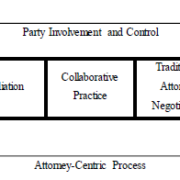Termination of Alimony: Proposed Changes to “Supportive Relationship” Standard
According to current state law, a Florida family law judge has the option to reduce or terminate an alimony award if he or she finds that the ex-spouse receiving payment (the “obligee”) is in a supportive relationship. The term “supportive relationship” currently has somewhat of a tough standard to overcome. For example, one factor in determining whether a supportive relationship exists is whether the obligee and his or her current boyfriend or girlfriend call each other “my husband” or “my wife” in public.
In a bid to curtail permanent periodic alimony and ease the ability for a paying spouse (the “obligor”) to modify or reduce his or her alimony obligation, Florida HB 549 proposes many changes to the “Supportive Relationship” standard. This bill will change current section 61.14(1)(b) of the Florida Statutes as follows (new language is underlined, while deleted language is stricken):
61.14 Enforcement and modification of support, maintenance, or alimony agreements or orders.—
(1)
(b)1. The court must may reduce or terminate an award of alimony if it determines upon specific written findings by the court that since the granting of a divorce and the award of alimony a supportive relationship has existed between the obligee and a person with whom the obligee resides. The court shall make specific written findings that support such a determination. On the issue of whether alimony should be reduced or terminated under this paragraph, the burden is on the obligor to prove by a preponderance of the evidence that a supportive relationship exists.
2. A person is deemed to maintain a supportive relationship when he or she shares a primary residence together with or without another person for a period of at least 3 continuous months in a common household. In determining whether the obligee is maintaining a common household, the court may consider any of the following factors an existing award of alimony should be reduced or terminated because of an alleged supportive relationship between an obligee and a person who is not related by consanguinity or affinity and with whom the obligee resides, the court shall elicit the nature and extent of the relationship in question. The court shall give consideration, without limitation, to circumstances, including,
but not limited to, the following, in determining the relationship of an obligee to another person:
a. Oral or written statements or representations made to third parties regarding the relationship of the cohabitants.
b. The economic interdependence of the couple or economic dependence of one party on the other.
c. The common household couple engaging in conduct and collaborative roles in furtherance of their life together.
d. The benefit in the life of either or both of the common household parties from their relationship.
e. The community reputation of the parties as a couple.
f. Other relevant and material factors.
a. The extent to which the obligee and the other person have held themselves out as a married couple by engaging in conduct such as using the same last name, using a common mailing address, referring to each other in terms such as “my husband” or “my wife,” or otherwise conducting themselves in a manner that evidences a permanent supportive relationship.
b. The period of time that the obligee has resided with the other person in a permanent place of abode.
c. The extent to which the obligee and the other person have pooled their assets or income or otherwise exhibited financial interdependence.
d. The extent to which the obligee or the other person has supported the other, in whole or in part.
e. The extent to which the obligee or the other person has performed valuable services for the other.
f. The extent to which the obligee or the other person has
performed valuable services for the other’s company or employer.
g. Whether the obligee and the other person have worked together to create or enhance anything of value.
h. Whether the obligee and the other person have jointly contributed to the purchase of any real or personal property.
i. Evidence in support of a claim that the obligee and the other person have an express agreement regarding property sharing or support.
j. Evidence in support of a claim that the obligee and the other person have an implied agreement regarding property sharing or support.
k. Whether the obligee and the other person have provided support to the children of one another, regardless of any legal duty to do so.
3. This paragraph does not abrogate the requirement that every marriage in this state be solemnized under a license, does not recognize a common law marriage as valid, and does not recognize a de facto marriage. This paragraph recognizes only that relationships do exist that provide economic support equivalent to a marriage and that alimony terminable on remarriage may be reduced or terminated upon the establishment of equivalent equitable circumstances as described in this paragraph. The existence of a conjugal relationship, though it may be relevant to the nature and extent of the relationship, is not necessary for the application of the provisions of this paragraph.
(11)
(c) If the obligor remarries or resides with another person, income and assets of the obligor’s spouse or person with whom the obligor resides may not be considered in the redetermination in a modification action.
(d) If an alimony award has been modified to terminate due to a supportive relationship and that supportive relationship does not produce a marriage, the obligee is not entitled to reinstatement of alimony from the obligor.
(e) If the court orders alimony concurrent with a child support order, the alimony award may not be modified due to the termination of child support when the child support payments end.
If you have questions regarding modification or termination of alimony and you are looking to retain an alimony attorney in Tampa Bay, call The Law Firm of Adam B. Cordover, P.A., at (813) 443-0615 or fill out our contact form.





Trackbacks & Pingbacks
[…] I previously wrote about a Florida House of Representatives Bill that proposed vast changes to the alimony statute and the “supportive relationship” standard to terminate alimony. […]
Leave a Reply
Want to join the discussion?Feel free to contribute!